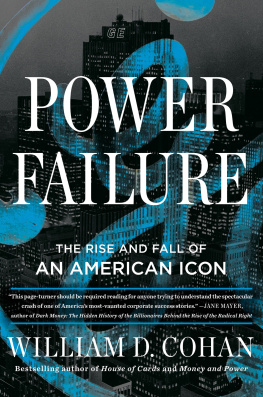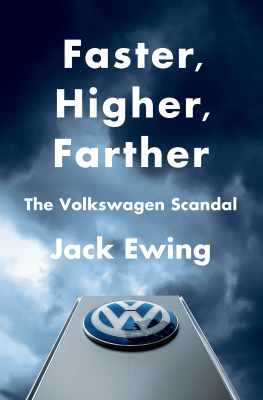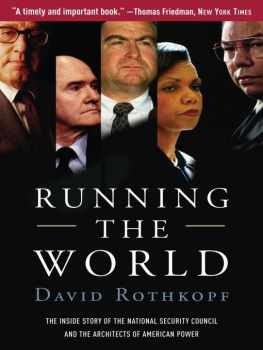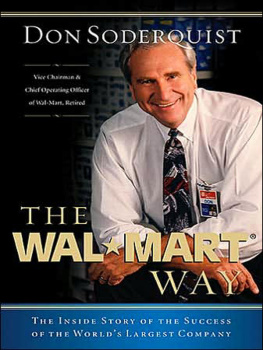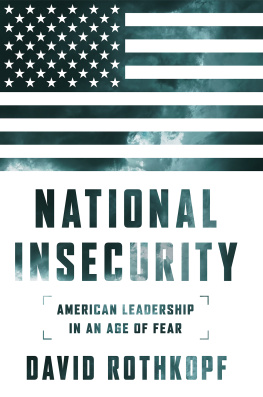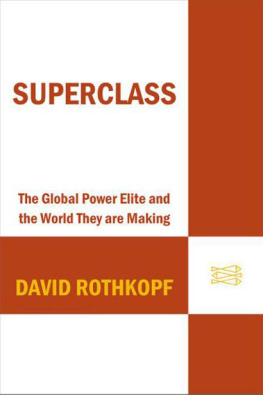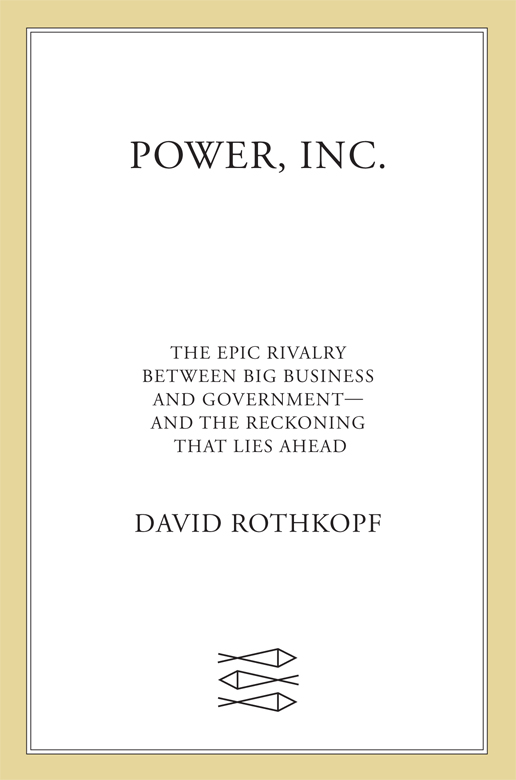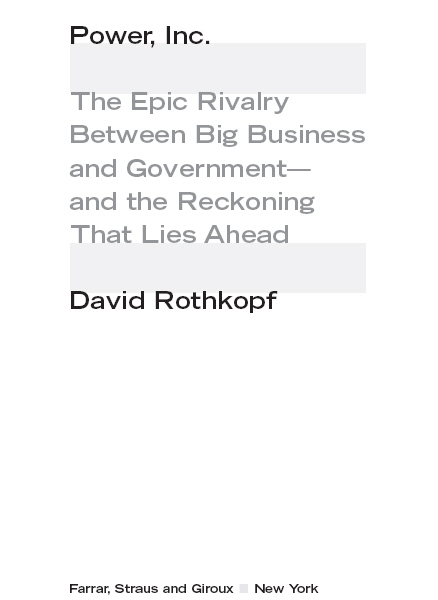
For my brother and sister
and siblings everywhere
who are the first to teach us about
the great rivalries we cannot do without
Its the best possible time to be alive when almost everything you thought you knew is wrong.
Tom Stoppard, Arcadia
Contents
Part 1
Part 2
Part 3
Introduction: Bodies but No Souls
Where possessions be private, where money bearethe all the stroke, it is harde and almost impossible that there the weal publique may justeleye be governed, and prosperously floryshe.
Sir Thomas More, Utopia
Corporations have been enthroned and an era of corruption in high places will follow, and the money power of the country will endeavor to prolong its reign by working upon the prejudices of the people until all wealth is aggregated in a few hands and the Republic is destroyed.
Abraham Lincoln, letter to Col. William Elkins
In most countries of the world today, there is a central tension that divides populations and helps define the shape and success of societies. At issue is how we balance public and private power. Differing national and regional approaches to resolving this tension will go a long way toward determining who leads and who follows in the global society of the twenty-first century, the role of evolving international institutions, and the very nature of how we organize ourselves as human beings on this planet.
The challenge is that the power of the people and the governments that represent them must harness, enable, and yet regularly offset the power of private actors and corporations that seek the maximum freedom to pursue their self-interests. It is an ancient struggle but one that has, in recent years, taken surprising turns that have forced many to question what have come to be basic assumptions about governance.
In the United States, the balance between public and private power is the defining political issue of the moment. Is government too big, a burden to society, and a threat to individual liberties? Or is it too ineffective a protector of average people, having been co-opted by big business and moneyed interests? Is it contributing to the general welfare or has it become a means of institutionalizing inequality, serving the few rather than the many?
In Europe, such controversies also roil furiously but they are joined by an intense argument over how much of the power of individual countries should be passed on to a collective European Union government, and about whose interests are best served by such collaborative governancea departure from the traditional idea and role of the nation-state.
In China, this public-private tug-of-war is visible at every level of a society that is reinventing itself at such a breathtaking pace that stability and growth often seem as irreconcilable as they are essential to each other. It is a challenge faced elsewhere in the emerging world as well, from the battles between Russias oligarchs and its government leaders and the sub-rosa relationships those battles sometimes obscure, to the social tumult we have recently seen in the Arab world, in which uprisings were as much against cronyism and governments that served the economic interests of elites as they were for individual freedoms and opportunities.
If the bloodshed, social experimentation, and ideological polarization of the twentieth century have offered us one lesson, it is that extreme solutions do not work when trying to balance public and private power. No society can effectively thrive without a balance between the two. When the balance between public and private power is lost, problemsoften large onesensue.
Recent developments demand we rethink issues that were widely discussedand, we thought, resolvedjust a few years ago. The end of the cold war did not bring the expected triumph of American capitalism. The marketplace and its dominant actors, while constantly gaining influence, have, as recent scandals and crises reveal, clearly overreached and abused their power.
In the United States in particular, but in many other countries that have adopted a U.S.-like model as well, those abuses have led to a sense that the balance has become far too tilted in favor of private power. Inequality has grown in terms of both economic outcomes and apparent privileges and prerogatives of a super-empowered elite withinand beyondthe law. The result has produced a backlash and fueled the emergence of other alternative models of capitalism, each of which is based on a different kind of public-private balance as well as on different philosophical, cultural, and historical foundations.
This book, then, is about the epic rivalry between public and private power that has taken place over the centuries, and about how it has entered a new stage. It is about how essential it is to strike a balance between the two while avoiding collaborations that are too cozy between those empowered by the people and those seeking private gains. It is about the new approaches to achieving that balance that are emerging as legitimate rivals and even likely successors to an American model that has, at least temporarily, lost its equilibrium and a not inconsiderable measure of its legitimacy. And it is about the emerging world order that turns not primarily on the interplay between states, but on that between a new collection of actors: a handful of traditional states and a majority of states so weakened that they are now effectively semi-states, an emerging class of increasingly empowered private global actors that might be called super-citizens, and of all the rest of us.
Ultimately, therefore, it is about the challenges we face and the choices we must make to achieve the right balance between public and private power in the rapidly changing international environment of the decades aheadand how history can help us gain the insights we need in order to do that.
The Evidence Is in the Headlines
In April 2010, in the wake of the financial crisis, Goldman Sachss CEO, Lloyd Blankfein, and several other top officials of the firm were summoned to testify before Congress. More than any other company, Goldman had come to symbolize Wall Street clout. Like previous hearings involving financial executives who had played significant roles in the meltdown of global markets in 2008 and 2009, this one followed a traditional script.
The executives could barely conceal their contempt for the Congress that had called them to Washington. They read carefully worded prepared statements that denied wrongdoing. They spoke of the market collapse as if it were something like a turn in the weather. Unfortunately, said Blankfein dryly, the housing market went south very quickly. So people lost money in it.
Members of the Senate committee before which they were testifying derided the fundamental conflict in Goldmans selling financial products that its own executives characterized as shitty or crap. The executives didnt flinch. One primly denied that they used that kind of language. For eleven hours the Congress attacked and the Goldman executives squirmed but argued that the products they sold were nothing but tools to reduce client risks, despite all evidence demonstrating that they had actually increased them.
America had been rocked by a financial crisis that had triggered the worst economic downturn since the Great Depression of the 1930s, and Congress, playing to angry Main Street constituencies, was talking tough. Senator Carl Levin, who chaired the hearing and whose home state of Michigan had been hard hit by the economic tsunami, condemned the fact that firms like Goldman had been having their way with government thanks to the armies of lobbyists the banks deployed who fill the halls of Congress, hoping to weaken or kill legislation. That was going to have to come to an end. Washington was going to have to crack down on the practices that had brought about the devastating global downturn. Levin characterized the behavior of Goldman and similar big Wall Street investment houses as unbridled greed in the absence of the cop on the beat to control it.


